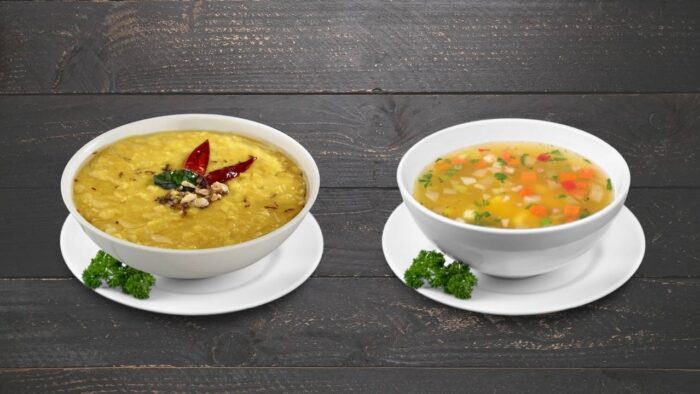Foods prepared with several ingredients and processes in particular ways are grouped as kṛtanna varga (family) in ayurvedic texts. Yusha is the term for hot soups made of vegetables or pulses.
This family of foods is mentioned in the Astanga Hridaya from 2000+ years ago, and has continued to be used medicinally, uninterrupted and continuously handed down for thousands of years. kṛtanna foods are considered to be among the best medicines for shifting the doshas and are therefore highly prescribed as part of the therapeutic diet. kṛtanna foods usually include seeds of beans or grains seasoned with cooling salt, pungent spices and some appropriate sneha (oily) substance such as oil, fat or ghee.
Among the kṛtanna (kṛt, process, anna, food, S.) preparations are the yusha, soups made of vegetables or pulses. 22 yushas (यूष) are described in detail in a text called the Kaiyadeva Nighantu, one of dozens of compendia of Bharat's natural pharmacopoeia, which extended knowledge from modern-day Afghanistan through the Indian subcontinent and along the Indian Ocean rim through Indonesia. Kṛta-yusha is both heavily nourishing and helps build the body's tissues but is also easier to digest due to the combination of ingredients and the method more difficult to digest.
Six preparations of yusha soups are described in the ancient texts, in which each soup is required to have three components present: saindhava lavana (salt from the Sindh); pungent (katu) spices such as dry ginger (sunthi), coriander (dhanyaka), cumin (jeeraka), pippali; and a non-refined seed oil or ghee. This combination makes the preparation evolve into a heavily-nourishing but light-to-digest food. The six preparations are made of mudga (green gram), kulatta (horse gram), chana (bengal gram), and 5 gram-grains (yava, kola, kulathya, mudga, mulak).
The preparation of each different type of yusha takes the main ingredient through its raw form, which is heavy to digest (guru), into water that is boiled, into which some salt is added. As the monsoon season (varsa ṛtu) approaches, the weather becomes windy, bringing in cool air, wetness and humidity. This change in wind, water, and temperature makes the body more aggravated in the three doshas and promotes low digestive power and fever. Adding yusha to the daily diet helps to calm the doshas.
सः स्यात् कृताख्यो लवणकटुस्नेहादिसंयुतः |
अकृताख्यस्तद्रहितः क्रमाद् गुरुलघू मतौ ||६३||
दकलावणिकः सर्वः साधितो लवणोदकैः |
यूषस्तनुरसः स्वल्पमात्रः स ज्वरनाशनः ||६४||
(Kaiyadeva nighantu, chapter 5, sloka 63-64)
Transliteration:
saḥ syāt kr̥tākhyō lavaṇakaṭusnēhādisaṁyutaḥ |
akr̥tākhyastadrahitaḥ kramād gurulaghū matau ||63||
dakalāvaṇikaḥ sarvaḥ sādhitō lavaṇōdakaiḥ |
yūṣastanurasaḥ svalpamātraḥ sa jvaranāśanaḥ
Translation: Over the course of preparation of kṛta foods, the use of salt and pungent with oils makes the food evolve from guru (heavy-to-digest) to laghu (light-to-digest). In all types of yusha, cooking with water and saindhava salt are required. The [pitta-cooling nature of this] salt used in the process of cooking helps to subside the mild fever disease common to this season.
In India, the varsa ṛtu follows the extreme heat of greeshma (hot, dry summer) during which the person's sweat pores carry heat out of the body and deplete the central heat store in the trunk. This low central heat reduces the digestive power and appetite of a person, so the Agnibala (digestive fire) becomes very low. As varsa ṛtu rushes in wind and cloudy weather, cools the hot dry summer air, and humidifies the hot ground, creating steam and humidity, these elements of wind, cold, humidity aggravate the body and agnibala further.
Just as all ṛtus have distinct dietary guidelines, in varsa ṛtu foods such as yusha are described to increase the agnibala in the body. The Ayurveda classics vividly describe the foods yava (barley), yusha (soup) of mudga (mung) with other cereals such as rice, millets and wheat, old honey, and different types of salts with their minerals such as souvarcha lavana. These help people regain health when they diligently follow rules for preparation and for consumption and help them sustain a daily healthy life throughout the year.
************************************************





